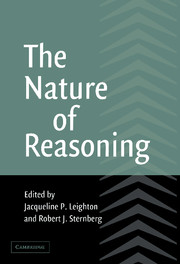Book contents
1 - Defining and Describing Reason
Published online by Cambridge University Press: 05 July 2011
Summary
Approximately a year ago I began to believe that reasoning was problem solving's poor cousin. In comparison to problem solving, which involves strategically overcoming obstacles in pursuit of a solution, reasoning seemed vague in function. In fact, reasoning has undergone a variety of definitions. As Raymond Nickerson indicates in this volume, reasoning has, on the one hand, been defined narrowly as the process of drawing deductive inferences and, on the other hand, as an aspect of thinking that is involved not only in drawing inferences but in making decisions and solving problems as well. Has reasoning been defined so broadly and redefined so frequently that it has lost its significance? Put another way, could reasoning be legitimately subsumed under problem solving or decision making without any loss? I no longer think so.
The purpose of the present book, The Nature of Reasoning, is to provide a comprehensive examination of the significance and distinctiveness of reasoning and, of course, at the same time, to indicate how it mediates other cognitive operations, such as problem solving and decision making. The book organizes in one volume what is known about reasoning, including its structural prerequisites, mechanisms, susceptibility to pragmatic influences and pitfalls, and bases for development. By focusing on factors that are pertinent to reasoning across domains, we present a united and comprehensive analysis of reasoning – an analysis that will inform anyone who is interested in learning about the fundamental factors and critical issues in reasoning research today.
Information
- Type
- Chapter
- Information
- The Nature of Reasoning , pp. 3 - 11Publisher: Cambridge University PressPrint publication year: 2003
Accessibility standard: Unknown
Why this information is here
This section outlines the accessibility features of this content - including support for screen readers, full keyboard navigation and high-contrast display options. This may not be relevant for you.Accessibility Information
- 10
- Cited by
